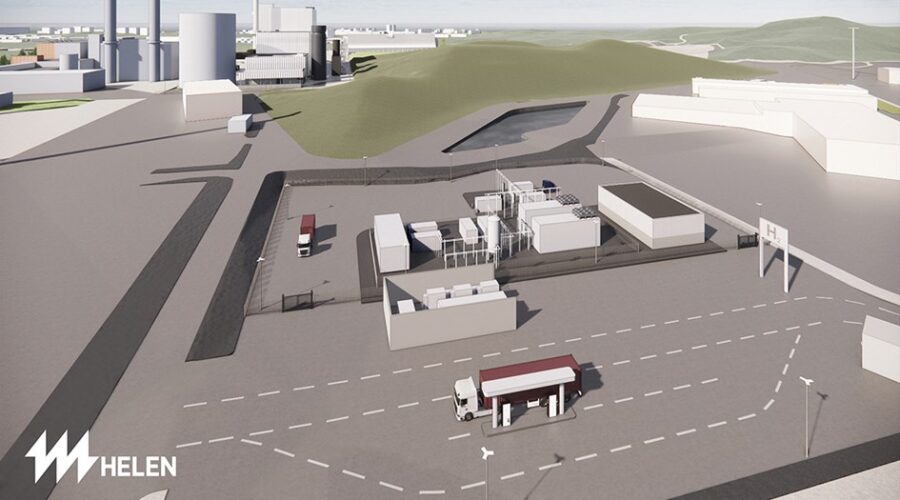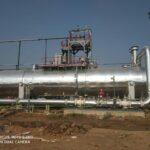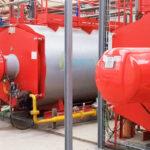Helen to invest in Helsinki’s first green hydrogen production plant
Helen, will build a green hydrogen production in Helsinki plant in Vuosaari, Helsinki. This is Helen’s first hydrogen project with which the company will increase its expertise to meet the needs of large-scale hydrogen production and enhance the flexibility to the entire energy system. This is also the first green hydrogen production plant to be built in Helsinki.
The capacity of 3H2 – Helsinki Hydrogen Hub pilot plant project – will be approximately 3 MW. The produced hydrogen will primarily be used through a hydrogen filling station to be built in connection with the plant, which is mainly intended for heavy transport. It is also possible to deliver hydrogen to customers in containers. The plant will be located in the vicinity of Helsinki’s district heating network and the busy Vuosaari Harbour. The waste heat generated in the production process will be utilised in Helen’s district heating network, which means that the overall energy efficiency of the plant is over 90%.
Plant energy efficiency
También será posible entregar hidrógeno a los clientes en contenedores. La planta estará ubicada cerca de la red de calefacción urbana de Helsinki y del concurrido puerto de Vuosaari. El calor residual generado en el proceso de producción se utilizará en la red de calefacción urbana de Helen, lo que significa que la eficiencia energética general de la planta supera el 90%.
Sari Mannonen, SVP, New business and hydrogen, said: “Hydrogen is an essential part of Helen’s new strategy and we are committed to investing in the development of the hydrogen business. We are excited to start building Helsinki’s first green hydrogen production plant,”
The aim is to launch the hydrogen production in the new plant in 2026 and open the filling station in 2027.
The project will reduce CO2 emissions by 3,700 tonnes per year. The amount has been calculated taking into account the replacement of fossil fuels in heavy traffic and the utilisation of waste heat in the district heating network.
The project was granted an investment aid of EUR 8.25 million for large-scale demonstration projects on new energy technology by the Ministry of Economic Affairs and Employment. In addition, EUR 292,500 of Environmental Penny funds were used for the containers to be obtained for the storage and transport of hydrogen.
Green hydrogen production plant with renewable and emission-free electricity
En la planta 3H2, el hidrógeno se producirá con electricidad renovable, lo que significa que la producción estará libre de emisiones. El hidrógeno tradicional producido con combustibles fósiles provoca importantes emisiones de dióxido de carbono. La reducción de emisiones convierte al hidrógeno verde en una alternativa atractiva, especialmente para el transporte pesado, pero también para otros sectores en los que la electrificación supone un reto.
Este es el primer proyecto de hidrógeno del mundo, que está diseñado para ser una parte integral de la optimización del sistema energético general de la sociedad en los mercados de electricidad, calor, transporte e hidrógeno, así como para servir como solución para la flexibilidad del sistema energético.
Waste heat for the district heating network
In the 3H2 plant, hydrogen will be produced with renewable electricity, which means that the production is emission-free. Traditional hydrogen produced with fossil fuels causes significant carbon dioxide emissions. Reduction of emissions makes green hydrogen an attractive alternative especially for heavy transport, but also for other sectors in which electrification is challenging.
This is the world’s first hydrogen project, which is designed to be an integral part of the optimisation of society’s overall energy system in the electricity, heat, transport and hydrogen markets as well as to serve as the solution for the flexibility of the energy system. In this project, waste heat generated in hydrogen production will be used in the district heating network in Helsinki, which means that the project is much more energy efficient than any project so far.
The aim of the project is to pilot the green hydrogen production and optimise production in terms of the demand for hydrogen, renewable electricity production and electricity market. In addition, we will use green hydrogen production to make sure that the new hydrogen technologies are functional. One important goal is also to maximise energy efficiency and increase flexibility in the energy system.
Helen has announced that it is planning to launch large-scale hydrogen production in the Vuosaari power plant area after the construction of this pilot plant. We have also commenced preliminary studies on the development of an industrial hydrogen valley in Uusimaa in collaboration with Neste Corporation, Gasgrid Finland Oy and Vantaan Energia Oy.
“We have set a target of making our energy production carbon neutral by 2030. Additionally, we plan to phase out combustion-based energy production by 2040. Our electricity production already consists mainly of wind, solar, hydro and nuclear power. In heat production, we are constantly increasing the use of sustainable bioenergy, electric boilers and heat pumps utilising waste and environmental heat. In the future, hydrogen will be an integral part of the sustainable energy system”.
Reinva
Reinva is a company specialized in the design, manufacturing, maintenance and after-sales services for industrial steam processes and combustion facilities, with the provision of equipment and services including industrial boilers, combustion systems, heat recoverers and treatment at the feed water to the boiler. Our activity is aimed at the objective of achieving energy savings in facilities. In the field of green hydrogen production, Reinva focuses its work on end-user applications.
Reinva supplies and commissions combustion equipment for urban district networks designed by the Spanish manufacturer E&M Combustión. The company has launched this technology in northern European countries, as well as eastern Europe and China. For Reinva, together with energy independence and the growing contribution of sustainable fuels, they represent a commitment to decarbonization and also present a greater performance of this type of district heating.
Source: Helen, Hydrogen Central, agencias








